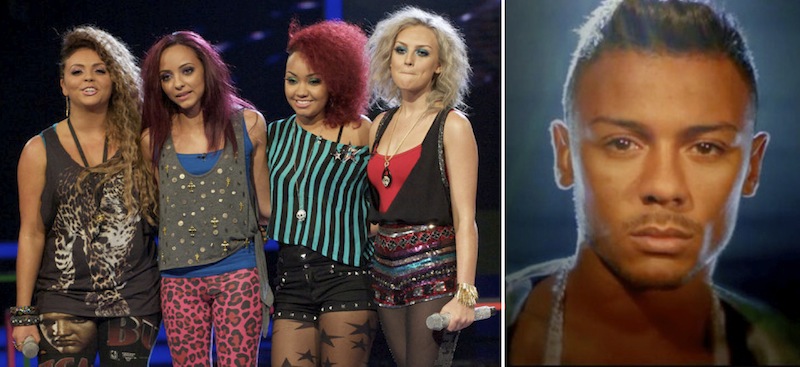Well, there we go. Another series of The X Factor about to splutter and crunch to a halt. Seventeen-year-old shouter Amelia Lily has been voted out despite actually turning in the finest performances of the night, leaving delightfully rough-round-the-edges girl group Little Mix and lovable Scouse cheeselord Marcus Collins (pictured below) in the running to “win an amazing recording contract” - in the full knowledge that, given the last couple of years' evidence, pretty much anyone in the final six or so contestants is guaranteed a contract and a good shot at chart success.

Unpicking the layers of insanity, inanity, awfulness and high-grade pop thrills that The X Factor has offered this year could fill tomes and treatises, but in short it's as British and as ridiculous as pantomime. Even without evil overlord Simon Cowell, who has decamped Stateside to chase world domination via X Factor USA, the character of the show remains strong, just expressed in a new set of rituals.
The awkward buffoonery of host Dermot O'Leary has been ramped up by several notches, as he has clearly decided he is some kind of National Treasure and entitled to his own set of goofy dance routines to introduce each show. His chummy over-familiarity with the contestants has increased, too: his endless shoulder massages, backslaps and headlocks as he introduced them on stage provided a few knuckle-chewing moments this season, although they noticeably tailed off later in the run, making us wonder if he'd been told to rein it in.
The new judges have provided their share of wince-inducement, too. Kelly Rowland of Destiny's Child has supplied an endless stream of wildly enthusiastic non-sequiturs, and favoured the preposterously out-of-touch elderly Irishman Louis Walsh with a new outlet for his difficult relationship to race. We haven't had a moment quite as eye-popping as Walsh telling a young contestant that he was like “a little Lenny Henry” (he wasn't), but his constant attempts to mimic Rowland's southern black American slang have been pretty difficult to watch.
Watch Amelia Lily duet with her mentor Kelly Rowland
Tulisa Contostavlos of N-Dubz has managed a few non-sequiturs of her own, generally designed to express her immense sincerity about how undying is her love for the acts she was mentoring. And Take That's Gary Barlow has provided a great replacement to the overseer role, replacing Cowell's shark-eyed sociopath character with a high-camp pop headmaster, his carefully studied expressions as tailored for the role as his Edwardian jackets, with one eyebrow permanently arched.
For all this, there has been some good pop music. The only truly awful comedy contestant has been the ghastly little scrote Frankie Cocozza with his would-be rocker pose undermined by absolute hopelessness in all aspects of singing and stagecraft. But otherwise we've had nothing as ridiculous as the Jedwards and Wagners of past series: even Johnny Robinson (Charles Hawtrey wrapped in Bacofoil) and the deranged Lady Gaga acolyte Kitty Brucknell transcended their novelty-act status with some great performances.
Pop is seen as providing the social mobility that is evermore elusive for working-class youngsters
Otherwise, there are a few contestants who may very well achieve commercial success. Biscuit-loving balladeer Craig Colton displayed ready wit and a fine set of lungs, hastily assembled and re-assembled boyband The Risk had some rock-solid harmony vocals, and haughty Mancunian Misha B achieved the impossible by bringing some relatively credible rapping (as well as a powerful singing voice and dazzling visual identity) to the later stages of the competition. As for the finalists, each of the last three were characterful, vocally strong, and had none of the blandness of previous contestants like 2009 winner Joe McElderry, 2010's housewives' choice Matt Cardle, nor the utter, utter hatefulness of McElderry's rival Olly Murs.
Watch Little Mix sing "Don't Let Go"
There's plenty to object to about the format, of course. Yes, it all feeds into the increasing pop monopoly of Simon Cowell's SyCo machine, which now apparently supplies the majority of Sony UK's music income. And the whizz-bang glitz of the production – bigger by far this year than in any previous series, and blown up to even more ridiculous extremes for the final broadcast from Wembley Arena in front of an audience of 10,000 – is the pinnacle of what Guy Debord called The Society of the Spectacle, self-perpetuating escapism purpose-designed to keep us watching and spending as the real world collapses in around us.
But, as with pantomime, through the cracks in the spectacle, we do see more than simple entertainment. The this-is-my-dream ambition of the finalists is easy to mock, but it is also a demonstration of the extent to which pop is seen as providing the social mobility that is evermore elusive for working-class youngsters.
And in-between the camp, the bickering and the idiocy are plenty of great performances. Whether it's Little Mix (pictured above left) pulling every ounce of high drama from En Vogue's “Don't Let Go” earlier in the series, or the previously uninspiring Amelia Lily (pictured above right) belting out Christina Aguilera's “Aint No Other Man” last night, when it's good it's really, really good; and it reminds us that however devalued pop music may be in an era of collapsing sales, the appetite for seeing people sing their hearts out live is still insatiable... and what else on TV is satisfying that?















Add comment